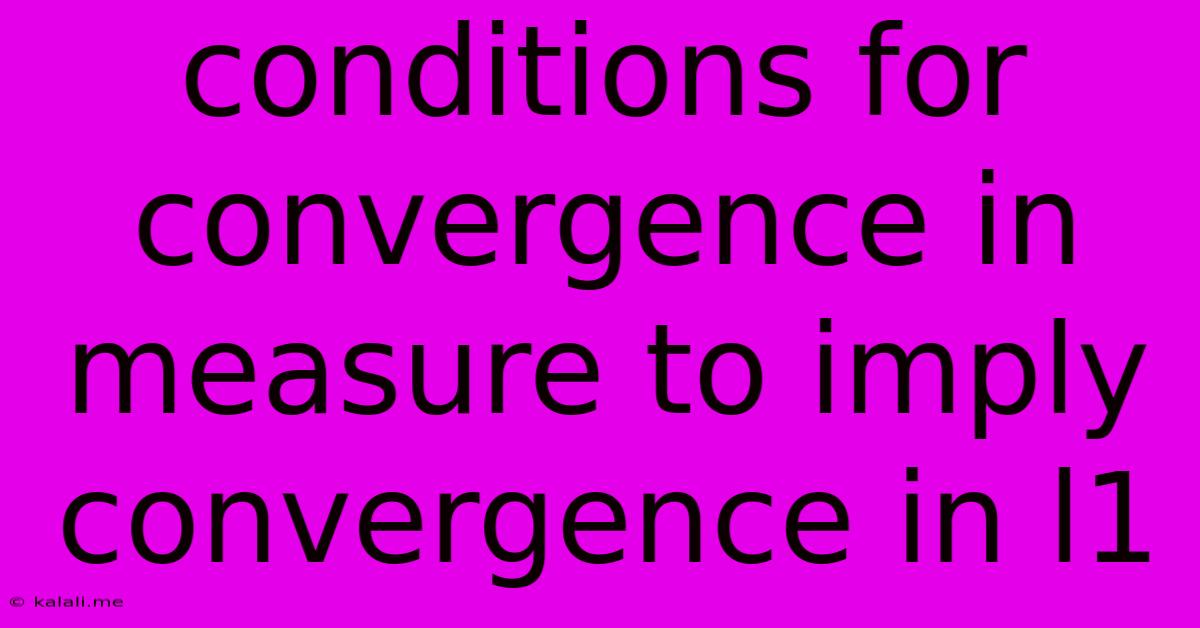Conditions For Convergence In Measure To Imply Convergence In L1
Kalali
May 23, 2025 · 3 min read

Table of Contents
Conditions for Convergence in Measure to Imply Convergence in L¹
This article explores the conditions under which convergence in measure implies convergence in L¹. Understanding this relationship is crucial in measure theory and its applications, particularly in probability and functional analysis. We'll delve into the necessary and sufficient conditions, providing clear explanations and examples to solidify your understanding. This is a key concept for anyone studying advanced calculus, analysis, or probability theory.
Convergence in measure and convergence in L¹ are both ways of describing how a sequence of functions approaches a limit function. However, they differ significantly in how they quantify this approach. Convergence in measure only considers the size of the set where the functions differ significantly, while L¹ convergence considers the integral of the absolute difference. This subtle difference leads to the need for additional conditions to ensure that convergence in measure implies convergence in L¹.
Convergence in Measure Defined
A sequence of measurable functions {fₙ} converges in measure to a measurable function f on a measure space (X, Σ, μ) if for every ε > 0,
lim (n→∞) μ({x ∈ X : |fₙ(x) - f(x)| ≥ ε}) = 0
This means that the measure of the set where the difference between fₙ and f exceeds ε becomes arbitrarily small as n tends to infinity.
Convergence in L¹ Defined
A sequence of measurable functions {fₙ} converges to f in L¹ if
lim (n→∞) ∫ |fₙ(x) - f(x)| dμ = 0
This signifies that the integral of the absolute difference between fₙ and f approaches zero as n goes to infinity. This is a stronger type of convergence than convergence in measure.
Why Convergence in Measure Doesn't Always Imply L¹ Convergence
Convergence in measure is a weaker form of convergence. Consider a sequence of functions where the difference between fₙ and f is concentrated on increasingly smaller sets, but the magnitude of the difference on those sets remains large. In such cases, the integral of the absolute difference might not converge to zero, even though the measure of the set where the difference is significant goes to zero.
Example: Consider the sequence of functions fₙ(x) = nχ<sub>[0, 1/n]</sub>(x) on the interval [0,1] with Lebesgue measure. This sequence converges to 0 in measure, as the measure of the interval [0, 1/n] goes to 0 as n approaches infinity. However, the integral of |fₙ(x)| is always 1, so it does not converge to 0 in L¹.
The Dominated Convergence Theorem: A Key Condition
The Dominated Convergence Theorem provides a crucial sufficient condition for convergence in measure to imply convergence in L¹. It states that if a sequence {fₙ} converges to f in measure and there exists an integrable function g such that |fₙ(x)| ≤ g(x) for all n and almost everywhere x, then {fₙ} converges to f in L¹. The existence of this dominating integrable function is key; it prevents the scenario described in the previous example.
Other Sufficient Conditions
While the Dominated Convergence Theorem is a powerful tool, other conditions can ensure that convergence in measure implies L¹ convergence. For example, if the measure space (X, Σ, μ) is finite and the sequence {fₙ} is uniformly integrable, then convergence in measure implies convergence in L¹.
Uniform Integrability Explained
A sequence of functions {fₙ} is uniformly integrable if for every ε > 0, there exists a δ > 0 such that for every measurable set E with μ(E) < δ, we have ∫<sub>E</sub> |fₙ(x)| dμ < ε for all n. This condition ensures that the integrals of the functions are controlled uniformly across the sequence, even on sets of small measure.
Conclusion
In summary, convergence in measure does not automatically imply convergence in L¹. However, sufficient conditions, such as the existence of a dominating integrable function (as guaranteed by the Dominated Convergence Theorem) or uniform integrability (particularly useful in finite measure spaces), ensure this implication holds. Understanding these conditions is critical for mastering measure theory and its practical applications. Remember to always consider the context and properties of the sequence of functions when determining whether convergence in measure implies convergence in L¹.
Latest Posts
Latest Posts
-
Fill A Screw Hole In Wood
May 23, 2025
-
Soldier Bored Most The Time Then Fierce Moments Quote
May 23, 2025
-
How Much Electricity Does A High Voltage Power Line Produce
May 23, 2025
-
The Cat Is In The Cradle Meaning
May 23, 2025
-
Which Number Is Divisible By Both 3 And 4
May 23, 2025
Related Post
Thank you for visiting our website which covers about Conditions For Convergence In Measure To Imply Convergence In L1 . We hope the information provided has been useful to you. Feel free to contact us if you have any questions or need further assistance. See you next time and don't miss to bookmark.